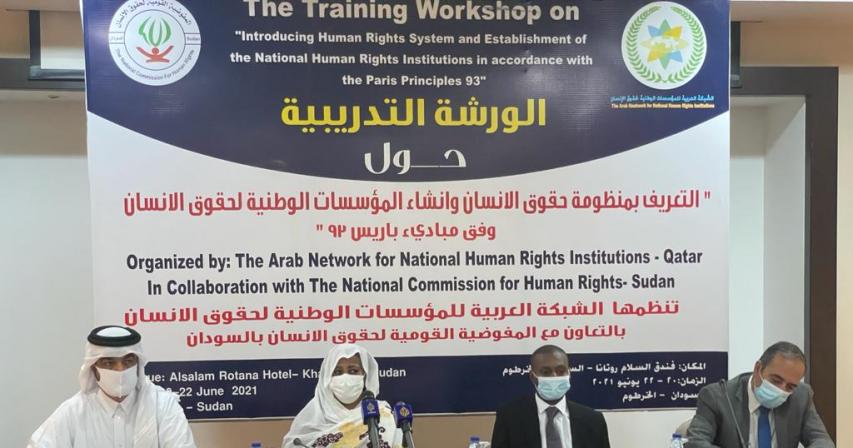Arab Network for National Human Rights Institutions Organizes Training Course in Khartoum
- 4 years ago

The Arab Network for National Human Rights Institutions (ANNHRI), based in Doha, in partnership with the Sudanese National Human Rights Commission, organized a foundational training course in Khartoum, Sudan, that introduces the human rights system and establishing national human rights institutions in accordance with the Paris Principles of 1993.
The training course came within the framework of implementing the ANNHRI's strategic plan to raise and build the capacities of individual member institutions, support and empower the newly established national institutions as well as their challenges and needs.
The training course aims to build the capacities of the Sudanese National Human Rights Commission's members and cadres in the field of compatibility of establishing national institutions with the Paris Principles and to highlight the accreditation process. The course also explains their role in promoting and protecting human rights in Sudan, as well as introducing regional and international mechanisms for human rights and identifying the needs and topics that the Commission affiliates wish to raise capacities regarding in the future.
HE Sudanese Foreign Minister Dr. Mariam Al Sadiq Al Mahdi thanked the ANNHRI for their efforts in organizing the training course and stressed that the workshop recommendations will find all the attention and commitment of the transitional government.
In Her Excellency's opening speech, she affirmed the Sudanese government's keenness on the independence of the National Human Rights Commission in all respects to work on the promotion and development of human rights in Sudan.
HE Foreign Minister said that the transitional government established legislative frameworks in all fields and has given priority to archive a just and comprehensive peace, ending the war by addressing the root causes of the crisis, which significantly contributes to the promotion of human rights in Sudan. She pointed out that the constitutional document included the Bill of Rights, which states freedom is guaranteed by the basic human rights conventions and charters, which may not be taken away or restricted except for the necessity required by civil society in a manner that preserves the rights of all members of society.
Executive Director of the Arab Network Sultan Hassan Al Jamali said that in the announcement of ANNHRI's establishment, the network considered the process of promoting, developing, protecting, respecting and actual realizing human rights in the Arab countries as the core issue.
Al Jamali explained that the training course usually targets newly established or re-established institutions, to remind and define the establishment of national human rights institutions in accordance with the Paris Principles and their role and tools in promoting and protecting human rights and that interacting with international human rights mechanisms will pave the way for constructive and integrated cooperation between stakeholders to achieve common goals.
Meanwhile, Head of the Steering Committee of the National Commission for Human Rights Dr. Rifaat Mirghani, explained that the formation of the committee was to fill the void of the national protection mechanism and stressed that the current situation in Sudan requires more consultations and broadening the base of participation in preparing the law, especially in the absence of the Legislative Council, which has the original competence to pass laws.
Dr. Mirghani said that there are signs of optimism in the field of human rights, including the repeal of laws restricting freedoms and interaction with the International Criminal Court, as well as the remarkable progress in media and press freedom.
(QNA)
Comments